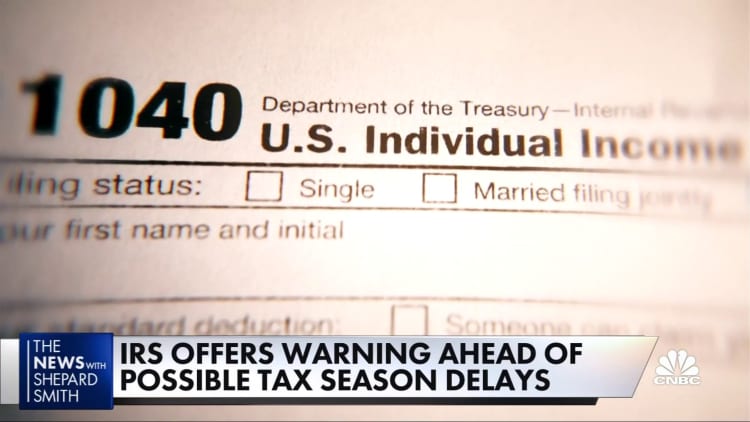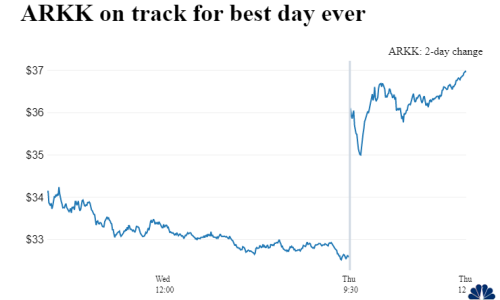
The upcoming tax-filing season is shaping up to be a chaotic one.
The National Taxpayer Advocate on Wednesday released a report to Congress detailing processing issues at the IRS last year and also offering a warning for this year’s tax season, which will begin when the agency starts accepting 2021 returns on Jan. 24.
“I am deeply concerned about the upcoming filing season,” said Erin M. Collins, the National Taxpayer Advocate. “Paper is the IRS’ Kryptonite, and the agency is still buried in it.”
More from Invest in You:
The ‘Great Resignation’ is being led by low-wage and minority workers
Why 26% of Americans expect their financial situation to be worse in 2022
How these entrepreneurs reinvented themselves after quitting their jobs
In December, the agency had 6 million unprocessed individual tax returns and 2.3 million unprocessed amended individual tax returns, according to the report. It also had backlogs of 2 million unprocessed employee quarterly tax returns and roughly 5 million pieces of taxpayer mail, some from April.
Many taxpayers remained without refunds some nine months after filing.
Additionally, Americans visited the IRS website to learn the status of their tax refunds more than 630 million times in 2021, a number that reflects deep frustration with the speed and efficiency of the tax collection agency, according to the report.
“The IRS is in crisis and needs to apply resources to its core mission – processing these returns and paying the corresponding refunds,” the watchdog report says.
How to avoid delays
The IRS is urging Americans to file their 2021 tax returns online and as soon as possible to avoid delays in processing and receiving refunds.
“Planning for the nation’s filing season process is a massive undertaking, and IRS teams have been working nonstop these past several months to prepare,” said IRS Commissioner Chuck Rettig in a Monday statement. “The pandemic continues to create challenges, but the IRS reminds people there are important steps they can take to help ensure their tax return and refund don’t face processing delays.”
The IRS anticipates that most taxpayers who file electronically, choose direct deposit and have no issues with their tax return will receive their refund within 21 days. It is sending out letters in January that should be used to accurately prepare returns.
“People should make sure they report the correct amount on their tax return to avoid delays,” Rettig said.
The IRS Free File program, which is available to taxpayers who made $73,000 or less in 2021, will open on Jan. 14, the agency said. In addition, many other tax-filing software programs will be available for people to use for the start of the season.
Individuals who received an economic impact payment or the advance child tax credit last year should be extra-careful, Rettig added.
In 2021, the IRS had issues with millions of e-filed returns due to various discrepancies and errors, according to the taxpayer advocate’s report. Those included 11 million math error notices that meant returns had to be manually reviewed and therefore experienced delays.
The most common problem the agency saw last year was with the recovery rebate credit, which people use to claim stimulus money they hadn’t yet received. This year, the taxpayer advocate’s report warned that the recovery rebate credit and enhanced child tax credit could lead to math error notices or other discrepancies, delaying refunds for filers.
Low-income filers are often disproportionately impacted by refund delays, according to the report.
“Millions of taxpayers rely on the benefits from these programs to pay their basic living expenses, and when refunds are substantially delayed, the financial impact can range from mild inconvenience to severe financial hardship,” the report said.
Start gathering tax information now
krisanapong detraphiphat | Moment | Getty Images
Of course, many Americans won’t have the paperwork they need to file their taxes until the end of January. Still, they should start gathering the materials they can and decide soon if they might want to enlist professional assistance.
“If you are seeking the help of a professional tax preparer or a CPA to file your taxes, they may be super-bottlenecked [in April],” said Sheneya Wilson, CPA and founder of Fola Financial in New York.
People can also start to prepare by looking at their previous tax return, experts say, which will give a guideline of what information you’ll need to collect for 2021.
Generally, you’ll need to gather any W-2s from employers, or 1099 forms, if you’re an independent contractor, freelancer or have a side hustle.
People who had any period of unemployment in 2021 should include a Form 1099-G, which will be sent to them from their state unemployment department. They should be prepared to pay taxes on those benefits, as well. Unlike in 2020, there is no tax break for people who got unemployment benefits this year.
For those who benefited from the child tax credit, a Letter 6419 will be sent from the IRS. Stimulus check recipients should look out for a Letter 6475 from the agency in late January.
SIGN UP: Money 101 is an 8-week learning course to financial freedom, delivered weekly to your inbox.
CHECK OUT: 3 money moves helped me save $100,000 by age 25, says Break Your Budget blogger via Grow with Acorns+CNBC.
Disclosure: NBCUniversal and Comcast Ventures are investors in Acorns.




